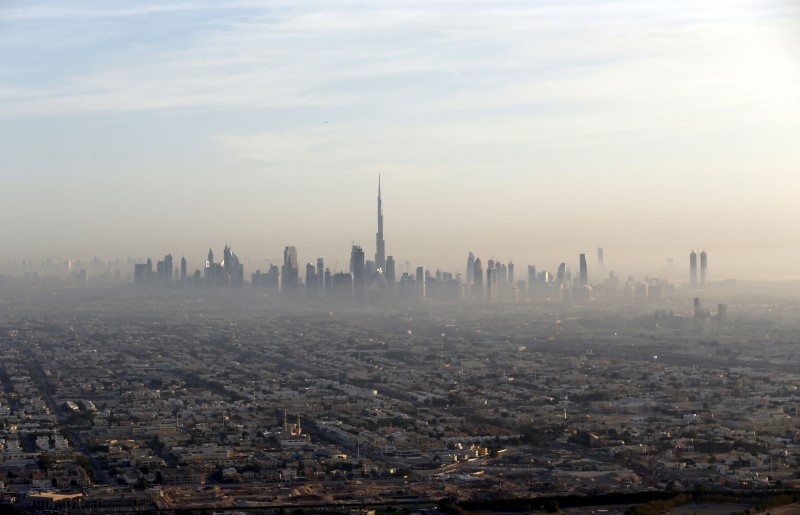 © Reuters. A general view of Dubai and the world’s tallest tower, the Burj Khalifa
© Reuters. A general view of Dubai and the world’s tallest tower, the Burj KhalifaBy Hadeel Al Sayegh
DOHA (Reuters) – Qatar’s 2018 state budget will focus on developing local industries and the private sector as the country works to make itself self-sufficient in the face of a boycott by other Arab states, Finance Minister Ali Sherif al-Emadi said on Tuesday.
In a speech to an international business conference, delivered exactly six months after Saudi Arabia, the United Arab Emirates, Bahrain and Egypt cut diplomatic and trade ties with Qatar, Emadi said the economy had escaped serious damage.
But he added that Qatar was determined never again to leave itself as vulnerable as it was in the initial weeks of the boycott, when the closing of its border with Saudi Arabia slashed imports of fresh food and other Gulf states pulled billions of dollars of deposits from its banks.
“It will take years and years for people to forget, and I don’t think they will forget,” he said, describing recent months as a “stress test” for Qatar financially, militarily and socially.
The four Arab states accused Qatar of backing terrorism, which Doha denies. At Tuesday’s conference, Emadi and other senior Qatari financial figures sought to convince hundreds of local and foreign businessmen that Doha could withstand the boycott indefinitely if necessary.
Emadi said the government would use subsidies to develop some sectors of the economy and boost growth. Doha is also studying how it can make the business environment more competitive and attract foreign capital, he added.
One area on which Qatar is focusing is the dairy industry, where a local company is using sophisticated technology to raise cattle in the desert; Emadi predicted the country would be wholly self-sufficient in some dairy products by the first anniversary of the boycott.
He also said Doha was looking at poultry farming, and that work on the project had started last week.
The government and the central bank have deposited billions of dollars in local banks to insulate them from withdrawals during the boycott, and Emadi made clear that the world’s top liquefied exporter was prepared to deposit billions more if necessary.
“If we see a systematic risk in the state of Qatar, we will make sure the government will intervene. There is no mistake about it.”
But Rory Fyfe, head of economics at Qatar National Bank (QA:), the country’s largest bank, said net outflows from Qatar’s banking system had halted in November. Outflows have decreased as Gulf depositors have run out of remaining funds to withdraw, and as banks have found new sources of foreign money.
Fyfe also estimated the non-hydrocarbon part of the economy would grow 4.5 percent this year – a figure that would make Qatar one of the region’s best-performing economies.
Government spending to resist the boycott has raised speculation that its sovereign wealth fund, the Qatar Investment Authority, with assets estimated at $300 billion, may sell some of its holdings to raise cash.
Emadi sought to cool that speculation by saying the QIA had been mandated to invest surplus money in long-term assets and would stay engaged in international markets.
Prominent foreign assets held by the QIA, such as a stake in Volkswagen (DE:), London’s Shard skyscraper and the Harrods department store, are providing great returns, he said.
Fyfe said financing Qatar’s public-sector growth would be a challenge next year, and that the government and some banks were likely to turn to the international bond market.
The government will comfortably be able to raise $9 billion through international bond issuance in 2018, said Yousef al-Jaida, chief executive of the Qatar Financial Centre, citing increased interest in Qatari debt among Asian funds.
Source: Investing.com



























